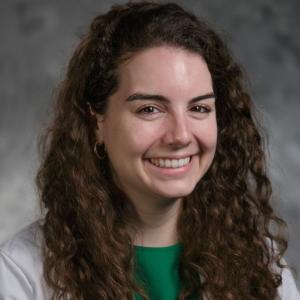
What are your career goals:
At the moment I see myself working more in an outpatient setting serving a diverse patient population. Would also ideally have time carved out for teaching of medical students/residents as well as health policy/advocacy work around mental health.
What attracted you to the Duke Family Medicine Residency Program?
The culture of the program is really one that values where you are coming from as a medical student in terms of your humanity. The faculty and residents really seemed to see me as a human first - not as a "soon to be doctor" first. This was incredibly important to me as I believe that the status quo of medical culture currently dehumanizes physicians from their point of entry into the field - i.e. as soon as you start medical school. For a multitude of reasons, I think this is incredibly harmful for both physicians and the patients/communities we serve. The Duke Family Medicine Residency program recognizes the problematic nature of the culture of medicine as a working environment and has folks who are actively trying to call out that culture/restructure it.
In your opinion, What makes Duke Family Medicine special?
Within the significantly large institution that is Duke - Duke Family Medicine has so far proved to be a smaller, tight knit community which I've really enjoyed. As isolating as intern year can be, whenever I've asked for help - people have showed up. Whether it's a co-intern, faculty member or senior resident, anytime I've voiced a struggle, difficulty, or concern, I've felt validated and supported. These seem like basic concepts - and they are - but amidst the rigorous training that is residency - simply being heard and not feeling like you are alone in what you are feeling can go incredibly far.
What strengths or skills do you have that could be of benefit to the community?
Although it took me some time to view it in this way - I see my vulnerability as a strength. It allows me to foster meaningful, profound relationships with both my colleagues and patients. Although navigating the appropriate way to be vulnerable with patients is still a work in progress (there are of course barriers to be drawn in a patient visit that are needed), I've found that being appropriately vulnerable with my patients allows the therapeutic relationship to form more quickly, and help my patients understand my own limitations as a human. With my colleagues my vulnerability has helped my peers realize there are not alone in the difficulties they've encountered as I too have struggled immensely with some of the things they have.
What are you passionate about?
The de-stigmatization of mental health within the physician community and creating a more realistic and humane training experience for physicians. The way the residency system is set up nationally at the moment does not allow for physicians to tap into their identities as individuals - which I believe contributes to poor mental health outcomes amongst physicians.
What is your hometown?
I grew up in Dubai in the United Arab Emirates but my parents now live in London.
What is something interesting that not many people know about you?
I have lived in 6 countries
So far, what has surprised you most about Duke?
When I meet patients, they see me as a doctor, "from Duke." Having completed medical school in a small state, the fact that a healthcare institution can be so large that it is almost viewed as a community in and of itself was surprising to me. I believe the downstream effects of this are complex, but the one that has surprised me the most is that the patients who come to Duke for their healthcare often are in search of answers after having interacted with many different healthcare providers. Learning how to meet this expectation as a provider, especially when you don't have the answers, is an entire skill set on its own that I hadn't truly internalized before starting here.